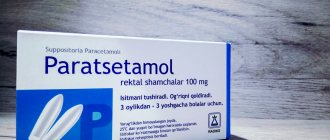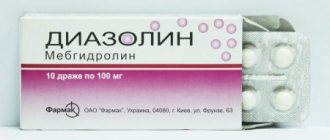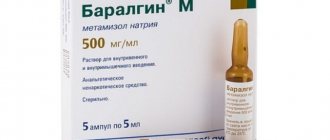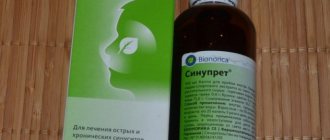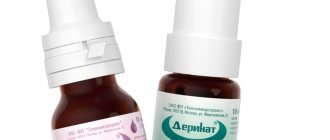The drug "Sinupret" during pregnancy: indications and use
No matter how much the expectant mother monitors her health, ubiquitous pathogens - viruses and bacteria - can still overtake her and reward her with a number of unpleasant symptoms, such as coughing, sneezing, nasal congestion, and redness of the throat. Many pregnant women are especially interested in the question of how to treat a runny nose during pregnancy. In these cases, you cannot do without the drug "Sinupret".
The drug "Sinupret" during pregnancy. Indications for use and composition
“Sinupret” is a medical drug that is prescribed to patients for nasal congestion, acute respiratory infections, sinusitis, tracheitis, bronchitis, pharyngitis, and acute respiratory viral infections. It is produced in the form of drops or dragees. Its main components are the roots, stems or flowers of herbs, which, when used together, enhance each other’s actions and provide invaluable assistance in the fight against the disease. Elderberry and primrose inflorescences, gentian roots and sorrel, which are part of this wonderful medicine, liquefy viscous sputum, facilitating its smooth removal from the body by expectoration. And this, in turn, relieves inflammation and swelling of the sinuses near the nose, thereby making breathing easier. Verbena and primrose color will prevent dangerous viruses from multiplying further.
The drug "Sinupret" during pregnancy. Application
In the first three months of a woman’s pregnancy, very important processes occur in the embryo to form the main organs of the unborn child. Therefore, it is during this period that doctors strictly prohibit the expectant mother from taking most medications. And the drug “Sinupret” during pregnancy is one of the few medications that doctors allow to be taken at any time. Moreover, the medicine is prescribed in the form of pills. Sinupret drops, due to the alcohol content in them, are prescribed only in extreme cases, if a pregnant woman is not able to take the pills. Drink the drug three times a day before meals.
The drug "Sinupret" during pregnancy. Side effects. Contraindications
Any drug (both synthetic and natural) has its side effects and contraindications. Even medicinal herbs, especially if they are very effective, are not always harmless when used and can have a very strong allergic effect. After all, during pregnancy, a woman’s body has unprecedented hypersensitivity. Therefore, when using this drug, you need to listen carefully to yourself in order to notice the slightest signs of an allergy in time. In addition, the drug "Sinupret" is prohibited for use by mothers who are breastfeeding and children under two years of age. The drug in the form of pills is prescribed to children after the age of six.
The drug "Sinupret" during pregnancy. Reviews
A significant proportion of patients taking this natural medicine tolerated it normally. Although in some, quite rare cases, patients experienced allergic reactions in the form of skin rash, itching, redness of the body, swelling or shortness of breath. Abdominal pain and nausea appeared. It is not recommended to use Sinupret after treating alcoholism. In case of liver disease, the drug in drops should be used with caution.
Special Notes
The bottle of drops must be shaken before use. Store in an upright position. Available in pharmacies without a prescription.
Forms of release of the drug: dragees, syrup, drops and their purpose
There are three forms of the drug:
- dragee: Sinupret - film-coated tablets, No. 50;
- Sinupret Forte - film-coated tablets, blister No. 20;
The medicine in syrup form is intended for children. It can be prescribed to pregnant women when it is not possible to use pills, and the potential risk to the fetus is lower than from the disease itself. The syrup contains alcohol. That is why it is prescribed with caution to expectant mothers. In addition, it contains cherry flavoring, which can cause allergic reactions.
Sinupret drops are prescribed according to the same principle as syrup: in cases where it is not possible to be treated using pills. The reason is similar: ethanol, which can affect fetal development.
Dragee is the most acceptable form of the drug for pregnant women. Does not contain hazardous substances, does not cause allergies, except in cases of individual intolerance to the components. Over many years of practice of using Sinupret, side effects were observed in only 0.66% of cases of the total number of patients.
There is such a practice of prescribing the drug depending on the stage of pregnancy:
- in the first trimester - only tablets are allowed. This is the period of laying the main organs of the unborn child, so the slightest factors that could affect the correctness of the process should be excluded. Syrup and drops are contraindicated due to their alcohol base;
- in the second trimester - drops and syrup are allowed as an exception. Drops can also be used for inhalation;
- in the third trimester, all the child’s organs are already formed, the harm from the drug is minimal. During this period, a specialist may prescribe a tablet version of Sinupret.
During pregnancy, Sinupret is prescribed to treat ENT organs, relieve inflammatory processes in the nasopharynx and as an immunomodulator.
Release forms of Sinupret - photo gallery
The syrup is allowed for children from 2 years of age and pregnant women in the 3rd trimester
Dragee is the most acceptable form of the drug for pregnant women
Sinupret drops contain ethanol, so they should be used with caution. The form of the drug allows you to reduce the single dose
Sinupret during pregnancy - helper or enemy?
With the onset of pregnancy, the immune system weakens. To prevent the uterus from rejecting the fertilized egg, the protective forces are reduced. This way a woman can carry the fetus to term and give birth to a child on time. But the expectant mother becomes very vulnerable to infections, viruses and bacteria. And most often the respiratory organs are affected. Rhinitis becomes a companion for many pregnant women. For treatment, the doctor may recommend drugs based on herbal components, for example, Sinupret. But is this drug safe during pregnancy?
Instructions for use (method and dose)
Sinupret can be used as a monotherapy or in combination with antibiotics. The choice of treatment regimen depends on the severity of the disease, the condition of the pregnant woman and is prescribed by the doctor after an individual examination.
Dragees and drops are taken orally regardless of food intake. The dosage and frequency of use are written in the instructions or set individually by the doctor.
During storage, sediment may appear in the drops, which does not affect the effectiveness of the drug. Shake the bottle before use.
Before using Sinupret, especially in the first weeks of pregnancy, the expectant mother should consult a doctor. He will select the exact dosage and determine the medication regimen.
Sinupret dragees are swallowed without chewing and washed down with water.
There are several general rules for the use of the drug that must be followed by all categories of patients, including pregnant women:
- Dragees are taken three times a day, half an hour before meals, washed down with boiled water or other liquid.
- Drops should also be taken 30 minutes before meals three times a day. The required amount of the drug is diluted in water.
- The medicine in tablet form must not be chewed, otherwise its effectiveness will decrease. When the pills are swallowed, the active substances safely reach the small intestine, where the drug is absorbed into the blood.
- In some cases, an aqueous-alcoholic solution of Sinupret is prescribed for inhalation procedures, before which it is mixed in a certain proportion with saline solution.
Composition of the medicinal product and release form
Sinupret is a complex herbal preparation. It consists of the following components:
- Gentian root: has a thinning property. In combination with other herbal components, it is effective against inflammation of the nasal sinuses in chronic and acute forms;
- elderberry flowers: have decongestant and anti-inflammatory properties, and also thin mucus in the nasal cavity;
- sorrel herb: effectively fights inflammation and also has an antibacterial effect against pathogenic microorganisms that cause respiratory diseases;
- primrose flowers: not only relieve inflammation, but also have antimicrobial activity;
- verbena: relieves swelling of the nasal mucosa and has antiviral properties.
All five herbal components in combination help with diseases of the nasal cavity. Sinupret is available in two forms:
- Round-shaped dragees covered with a green shell. The package contains 50 tablets for oral administration;
It is worth noting that the drug in drops is not intended for instillation into the nasal passages. The drops should only be taken orally, diluted in a small amount with water.
While taking Sinupret, secretion is regulated and tissue swelling is reduced. The drug helps normalize the protective function of the respiratory tract epithelium.
Sinupret's analogs
The drug Imupret has a similar natural composition. The drug relieves inflammation and swelling, promotes the formation of immunity. Imupret is available in the form of dragees and drops; the second type of drug is not recommended for use by pregnant women because it contains ethyl alcohol. Treatment with this drug should be carried out under the supervision of a physician.
Miramistin is a broad-spectrum antiseptic, effective against gram-positive, gram-negative, aerobic and anaerobic microorganisms. The drug can also cause the death of some viruses. In ENT practice, Miramistin is used to gargle or to rinse the sinuses during a puncture. When applied topically, it does not reach the fetus.
The drug Nasonex, available in the form of nasal drops, is a hormonal drug with an anti-inflammatory effect. The main indication for its use is chronic sinusitis. The drug does not enter the systemic bloodstream and therefore does not cause a negative effect on the fetus. Self-prescription of the drug is strictly prohibited, since Nasonex has strict contraindications for use.
An effective analogue of Sinupret is the drug Isofra. Its active ingredient is the antibiotic Framycetin, which belongs to the group of aminoglycosides. The drug destroys many strains of staphylococci, streptococci, Klebsiella, Enterobacteriaceae, Salmonella, Proteus.
Isofra is available in the form of a nasal spray; when applied topically, it is practically not absorbed into the systemic circulation, so the drug does not reach the fetus. However, this medicine must be prescribed by a doctor.
The principle of action of Sinupret tablets and drops
Sinupret has an expectorant (secretolytic and mucolytic) and anti-inflammatory effect. Each of the five herbal components complements and has a positive effect on the respiratory system during the period of illness:
- after starting to take it, it has an anti-inflammatory effect, thereby alleviating the woman’s condition;
- relieves swelling of the nasal mucosa, reduces the viscosity of sputum;
- helps stimulate the work of the cilia that line the sinuses. In this way, the sputum is liquefied and the nasal passages self-cleanse from mucus;
- prevents further spread of the disease, has a preventive effect against complications.
Is it possible to take Sinupret in the 3rd trimester?
The third trimester is the last stage of pregnancy, which begins from the 28th week of antenatal development of the fetus. At this time, all the organs of the unborn child are formed and begin to function. For colds accompanied by a runny nose, doctors often prescribe Sinupret during pregnancy in the 3rd trimester. This is due to the important advantages of this medicine compared to other nasal decongestants.
Doctors advise taking Sinupret during pregnancy in the 3rd trimester, because this medicine consists of active phytocomponents:
- gentian root;
- sorrel herb;
- verbena herbs;
- elderberry herbs;
- flowering and calyx parts of the primrose.
These plants do not have a vasoconstrictive effect on the mucous membrane, but only establish an outflow system from the source of inflammation, helping to normalize the functioning of the lymphatic and venous network of vessels in it.
Sinupret is able to inhibit the replication of cold viruses (RSV, influenza A and parainfluenza), which makes it possible to avoid the development of the disease when using the drug at the initial stage of the disease.
Sinupret is also able to improve metabolic processes in tissues and the functioning of the capillary bed, and increase local immunity of the mucous membrane of the respiratory tract.
In what cases is Sinupret recommended for use?
Respiratory diseases during pregnancy must be treated. Therefore, at the first symptoms, it is necessary to consult a doctor to determine an accurate diagnosis and prescribe a treatment regimen. Normal rhinitis, which the body dealt with in a few days before pregnancy, can drag on during the period of waiting for the baby and lead to serious complications. Many expectant mothers neglect treatment with medications so that fewer drugs pass through the mother’s body to the fetus. In this regard, experts warn that a prolonged runny nose, sinusitis or sinusitis is much more dangerous for a child than medications, so you need to cope with the disease as quickly as possible.
Nasal congestion causes difficulty breathing, so less oxygen enters the woman's body. Accordingly, less of it reaches the fetus. Doctors warn that a lack of oxygen can lead to gestosis, which may delay the development of the unborn baby. And if oxygen starvation continues for a long time, this can lead to intrauterine fetal death or premature birth.
Causes of a runny nose, diagnostic methods and treatment principles - video
Indications for use of Sinupret
- Sinusitis in acute or chronic form: inflammation of the mucous membranes of the sinuses;
- nasal congestion;
- sinusitis as part of complex therapy;
- frontal sinusitis - inflammation of the mucous membrane of the frontal sinuses;
- allergic rhinitis: helps thin mucus and facilitate breathing in combination with antihistamines.
According to the instructions, Sinupret should not be used without consulting a doctor. Only a doctor can prescribe Sinupret to an expectant mother. The dosage and maximum time of administration are determined only by a specialist. In practice, the drug is prescribed in any trimester of pregnancy according to indications. In some cases, when a woman cannot use Sinupret in pill form, the doctor may prescribe the drug in drops, but only from the second trimester. At the initial stage of pregnancy, the formation of organs and systems of the embryo occurs, so alcohol in the drops can have a negative effect on the unborn baby.
Instructions for use of the drug depending on the release form
Specialists from the Moscow Medical Academy conducted a study in which almost 80 pregnant women took part. As a result, doctors came to the conclusion that the components of the drug Sinupret do not have a negative effect on the fetus, and therefore can be used to treat expectant mothers, but only after being prescribed by a doctor. The doctor will develop a treatment regimen depending on the woman’s condition. According to the instructions, features of taking Sinupret:
- in pill form, the drug must be taken three times a day thirty minutes before meals. The tablets should not be chewed or crushed; they must be washed down with a sufficient amount of water or other liquid. The liquid should not be hot; you can wash the drug down with warm water;
- The principle of taking drops is no different from pills: they are also taken three times a day, half an hour before meals. The required dose of drops is diluted in a small amount of water;
- The duration of treatment is generally one to two weeks. Depending on the diagnosis, the doctor may reduce the course of treatment with Sinupret.
The drug in the form of drops can be prescribed as a solution for inhalation. The doctor calculates the required number of drops, which are mixed in sufficient proportions with saline solution. The frequency and time of the procedure is determined only by the doctor.
What is sinusitis - video
Instructions for use (method and dose)
Prescribed from 6 to 11 years of age, they are prescribed to drink 1 tablet at a time three times a day. For people over 12 years of age, you should drink 2 tablets at a time three times a day.
The course of treatment lasts from 1 to 2 weeks; If the therapy is ineffective, then you should consult a doctor about further use of Sinupret.
Sinupret tablets for pregnant women are sometimes prescribed at half the dose if the symptoms of rhinitis/sinusitis are mild.
Sinupret drops can be given to children from 2 years of age. Up to 5 years old, give 0.9 ml (15 drops) at a time, three times throughout the day.
At 6-11 years of age, a single dose of 25 drops is usually prescribed. (1.5 ml) for three times a day.
From 12 years old it is recommended to take 50 drops. (3 ml) of medication at a time three times a day.
The treatment course lasts from 7 to 14 days, unless the doctor gives additional recommendations. Usually the medication is taken before meals.
Pregnant women are usually not recommended to take Sinupret in solution. The doctor may make an exception if a woman is intolerant to one of the additional substances in tablets or pills.
If the drug is given to children, then in order to drown out its bitter taste, it should be dissolved in tea/juice. Adults take Sinupret without diluting it or, if desired, dissolving it in water.
For dyspepsia or reflux in the third trimester of pregnancy, the medicine can be taken after meals to avoid irritation of the stomach walls.
Only a doctor should prescribe the use of any medications to a pregnant woman. He will tell the patient how to take the drug correctly. In most cases, therapists prescribe Sinupret as written in the instructions.
According to the instructions, during pregnancy Sinupret should be taken 3 times a day, 2 tablets at a time, with half a glass of water. Typically, the period of use of the medicine ranges from 7 to 14 days.
It is worth noting that if the expectant mother is lactose intolerant, then she cannot take Sinupret in pill form. In such cases, the doctor, having considered what potential benefits the drug will bring to the mother and what the possible risk is for the health and development of the child, prescribes Sinupret to the patient in the form of drops. Drops, like pills, are drunk 3 times a day, 50 drops per dose. They are diluted in a small amount of water and drunk in one gulp.
Most young mothers who took Sinupret during pregnancy did not notice any negative effect of this drug on their well-being and noted that their babies were born healthy.
Contraindications for taking Sinupret
The drug is based on components of five medicinal plants, therefore the main contraindication to the use of Sinupret is the presence of individual sensitivity to one or more components of the drug. It is worth noting that women who are lactose intolerant should not take the drug in pill form. In this case, the doctor can notice them in drops.
According to reviews from women who took Sinupret, the drug was well tolerated and side effects were rare:
- allergic reactions: rash, itching, redness, swelling;
- pain in the epigastric region may appear half an hour after taking the drug. Sometimes pain occurs while taking drops, because alcohol can irritate the gastric mucosa in women who suffer from chronic gastrointestinal diseases. In this case, the doctor may replace the Sinupret form. If the pain continues, then the drug should be stopped;
- feeling of nausea.
If, after taking pills or drops, the expectant mother feels unpleasant symptoms, treatment with Sinupret should be stopped.
Before prescribing Sinupret, the doctor evaluates the course of pregnancy. This is due to the fact that the herbal components included in the drug can have a negative effect on the body of the mother and fetus. Primrose can cause increased uterine tone, so women at risk of miscarriage should take Sinupret with caution. Verbena and elderberry are mildly toxic plants and may cause cases of gastrointestinal distress (including stomach pain, nausea, diarrhea, vomiting, abdominal discomfort).
Side effects
As you know, side effects of medications can occur, although they are rare. It is important to note that often the result of side effects is individual intolerance to any components of the drug, which can take the form of nausea, allergic reactions, shortness of breath and abdominal pain.
Then you need to stop using the drug and immediately consult a doctor who will help you avoid disappointing consequences and choose a more effective treatment method. But such cases are not very frequent, so in most cases the drug can be taken without any restrictions.
But still, there are some important points that should be taken into account before starting the treatment course. It is worth recalling that great caution should be taken when taking this drug for those who suffer from diseases and injuries of the brain, epilepsy and liver diseases.
It is also impossible to say with confidence that this medicine is also absolutely safe for the life of the unborn child, since it consists of plant extracts that can cause an unexpected reaction of the body during pregnancy, which will inevitably affect not only the condition of the pregnant woman, but also no more developed than her fetus. That is why you need to listen only to the advice of your doctor and not self-medicate.
Although, according to the instructions, Sinupret is not prohibited during pregnancy, it still indicates the side effects that may appear when taking the drug, as well as contraindications in which the use of this drug is dangerous not only for the health of pregnant women, but also for any person.
We suggest you read: Why Buscopan for pregnant women - I’m pregnant
Possible side effects
- from the digestive system: nausea, vomiting, heartburn, pain in the upper abdomen;
- allergic reactions: shortness of breath, angioedema, itching, redness of the skin, skin rash.
Side effects are extremely rare.
Drugs that can replace Sinupret
If allergies or other adverse reactions occur, the doctor will select another remedy. The safest are solutions of sea water, but in some cases, treatment with these drugs alone does not give the desired effect, so they can be used in combination with vasoconstrictor and antiseptic drugs:
- experts first recommend drips of vasoconstrictor drugs that reduce nasal congestion, and then antiseptic drugs if the runny nose lasts more than 5 days and is infectious in nature;
- clear your nose by removing mucus;
- rinse the nasal passages with sea water to moisturize the mucous membrane.
In case of sinusitis, acute respiratory infections and acute respiratory viral infections, when the mucous membrane swells, washing can aggravate the situation by driving the fluid along with the causative agent of the disease into the middle ear, so do not neglect consulting a doctor.
Analogues of the drug
The herbal combination drug Sinupret does not have complete structural analogues, but at the same time, there are a number of medications that a doctor can prescribe to an expectant mother for diseases of the upper and lower respiratory tract, accompanied by a runny nose and difficult sputum discharge.
Functional “synonyms” of the drug:
- Tonsilgon N;
- Erespal;
- GeloMyrtol;
- Coryzalia.
The presence of Sinupret analogues does not give a pregnant woman the right to independently decide to replace one medicine with another.
Table: functional analogues of Sinupret
| Trade name of the drug | Release form | Active composition | Indications for use | Features of prescribing the drug to expectant mothers | Contraindications | Negative reactions | Estimated cost |
| Tonsilgon N |
|
|
| According to the official instructions, the prescription of a drug is possible if the benefits of its use outweigh the risk of adverse reactions. The tablet form is preferable during gestation, since the drops contain ethyl alcohol. |
|
| A bottle of aqueous-alcoholic solution with a dosage of 100 ml can be purchased for 380 Russian rubles. The average cost of a package containing 50 tablets is 330 rubles. |
| Erespal |
| fenspiride hydrochloride |
| The official instructions do not recommend taking the drug during gestation. But in practice, a doctor can prescribe pills to a pregnant woman in the second and third trimesters. You should avoid taking the syrup due to its alcohol content. | Individual intolerance to the components of the drug. |
| 30 tablets of Erespal can be purchased for an average of 350 Russian rubles, 150 ml of syrup - for 250 rubles. |
| GeloMyrtol | enteric-coated capsules |
|
| The use of the medication is possible in the last two trimesters of gestation as prescribed by a doctor, if the benefits of taking it outweigh the possible risks. |
|
| The average cost of 20 capsules is 330 Russian rubles. |
| Coryzalia | oral tablets |
|
| The official instructions do not prohibit pregnant women from taking the medication. But a specialist must prescribe treatment. | Individual intolerance to the components of the drug. | Allergic reactions in the form of skin rashes and itching. | The average cost of a package of 40 tablets is 305 Russian rubles. |
Photo gallery: what else can a doctor prescribe for a future mother with sinusitis?
Tonsilgon N tablets are not prohibited for use in all trimesters of gestation
Erespal tablets can be prescribed to pregnant women in the 2nd and 3rd trimesters
GeloMyrtol is prohibited for use during the first 12 weeks of gestation
Coryzalia is a herbal remedy approved for pregnant women.
Sinupret during pregnancy is a safe drug for the complex treatment of colds
Pregnancy is a crucial period for every woman, during which favorable conditions for bearing a fetus are created in the body. Due to a weakened immune system, a woman while pregnant is most vulnerable to colds and viral diseases. A banal acute respiratory infection can lead to more serious illnesses and also negatively affect the development of the embryo. As everyone knows, taking most medications during this period is undesirable, and in some cases, strictly contraindicated. Therefore, the homeopathic remedy Sinupret during pregnancy is a real salvation.
This drug helps with sneezing, runny nose, nasal congestion, excessive nasal discharge, etc. Can Sinupret be taken during pregnancy? Yes, you can. It effectively copes with the respiratory manifestations of bacterial and viral diseases, while remaining safe for the expectant mother and fetus.
Sinupret and pregnancy pathologies
Despite the proven safety of Sinupret for pregnant women, this drug should not be taken independently by women registered with a gynecologist due to pregnancy pathologies.
This is due to the fact that Sinupret contains phytoextracts of gentian, elderberry, sorrel and verbena. Parts of these plants, which are used to prepare Sinupret, contain caffeine, as well as bioactive compounds and alkaloids that can increase uterine tone.
A consultation with a gynecologist is mandatory for pregnant women if they want to take Sinupret for:
- Hypertonicity of the uterus;
- Abruption, presentation, early aging of the placenta and any type of placental insufficiency;
- threat of miscarriage, especially in the first trimester (first 10 weeks);
- severe manifestations of gestosis, eclampsia and kidney pathology, urolithiasis (due to the tendency of oxalic acid to form stones in them - oxolates).
If after Sinupret a woman notices a change in the activity of the fetus (too active movements or their absence for 2-3 hours), severe nagging pain in the lower abdomen, severe swelling and other signs of deterioration in well-being, you should urgently consult a doctor. The appearance of bloody discharge is a sign that urgent hospitalization by the ambulance service is needed to prevent the threat of miscarriage.
Composition and release form
Sinupret is a unique combination drug of plant origin that has an expectorant, secretolytic (reduces the viscosity of sputum), pronounced anti-inflammatory, secretomotor (stimulates the discharge of sputum), immunomodulatory and antiviral effects.
Sinupret is easily tolerated during pregnancy, without causing allergies or unwanted side effects, thanks to a thoughtfully selected composition of natural ingredients. The therapeutic effect of the drug is due to biologically active substances found in crushed gentian root, primrose and elderberry flowers, as well as in herbs - verbena and sorrel.
For adults, Sinupret is available in the form:
It is planned to release the long-acting drug Sinupret Forte with a double dosage of active substances.
If desired, you can choose a form of the drug that is convenient for treatment. If during pregnancy, due to a pronounced gag reflex, there are difficulties in swallowing Sinupret tablets or dragees, then it will be convenient to buy the medicine in liquid form. Typically, this method is indicated in exceptional cases, since it should be taken into account that the plant extract is infused with alcohol, and drinking alcohol during gestation is contraindicated.
Precautionary measures
Despite the safety of the drug, we must not forget about precautions. The only contraindication to taking the drug is intolerance to the components of the drug. In this case, taking the drug causes unpleasant symptoms, the following appear:
- nausea, vomiting;
- burning sensation in the nasopharynx;
- the appearance of edema;
- allergic skin reactions - rash, itching. Extremely rarely - Quincke's edema;
- pain under the sternum;
- digestive disorders associated with difficulty in the outflow of bile.
The drug does not cause negative reactions from the central nervous system, including a decrease in concentration. Therefore, when taking the drug, you do not need to stop driving a car.
So, Sinupret is allowed to be used during pregnancy. This drug is of plant origin, it does not have a negative effect on the development of the fetus. Sinupret is one of the few medications that can be used even in the first twelve weeks of pregnancy. But under no circumstances use the drug for self-medication. Consultation with a gynecologist before starting use is mandatory.
When should you take Sinupret during pregnancy?
According to the instructions, indications for taking Sinupret during pregnancy are:
- Diseases of the sinuses of the nose of an acute and chronic nature - sinusitis, sinusitis, allergic rhinitis, frontal sinusitis, etc.
- Inflammatory diseases of the bronchi, trachea, lungs - acute and chronic bronchitis, tracheitis, laryngitis, tracheobronchitis.
- Respiratory manifestations of viral infections and colds.
Sinupret is prescribed for pregnant women for sneezing, nasal congestion, runny nose caused by colds, flu, acute respiratory viral infections, acute respiratory infections, as well as for exacerbation of chronic sinusitis, sinusitis, bronchitis or tracheitis with the formation of viscous sputum.
The active ingredients of the drug reduce swelling of the nasal mucosa and upper respiratory tract, relieve inflammation, thin mucus and promote its removal, and facilitate breathing. The immunomodulatory effect is to activate the body's defenses to fight the disease.
Treatment with the drug is gentle but effective. Numerous studies have shown that taking Sinupret during pregnancy does not negatively affect either the woman’s body or the developing fetus. All biologically active substances are of natural origin and therefore do not cause complications or side effects.
Reviews from most pregnant women indicate good results from treatment with Sinupret . Even in advanced cases, the medicine effectively relieves swelling of the nasal mucosa, thins and improves the outflow of mucus from the bronchi. Sinupret forte acts 2 times faster, during pregnancy it alleviates a woman’s condition after the first days of taking it.
Indications for use
The drug "Sinupret" is an antiviral drug that supports the body's immune system. It is prescribed for high viscosity secretions in the sinuses caused by the following diseases:
- rhinitis, including vasomotor and allergic;
- sinusitis with copious mucous discharge;
- for various colds;
- otitis (acute, purulent and chronic, tubootitis);
- upper respiratory tract infections (tracheitis, sinusitis).
Did you know? The history of herbal medicine goes back to ancient times. Archaeologists during excavations of the ancient Sumerian civilization found fossilized samples of powders and ointments, writing on tablets with recipes based on herbs.
Instructions for taking Sinupret during pregnancy
Consultation with your doctor before starting treatment with the drug is required. He will select the required dosage and duration of the course. The therapeutic dose of the drug is 2 tablets or tablets 3 times a day. Sinupret should be taken 20-30 minutes before. before meals, with a small amount of water.
Sinupret drops are also taken half an hour before meals three times a day. Single dose – 30 drops diluted with water.
Recommendations for the use of Sinupret in early pregnancy
Before treatment with any drug, even homeopathic, you should consult your doctor. In the 1st trimester, it is advisable to take Sinupret in tablets or tablets. The required dosage and duration of treatment will be selected individually by the therapist, who will also monitor the progress of treatment. Read more about the first trimester→
Taking drops for a pregnant woman is undesirable, because the ethyl alcohol they contain can negatively affect the intrauterine development of the embryo. After all, in the first months, vital organs and systems are formed.
In the 2nd trimester of pregnancy, it is also better to use Sinupret in tablets or dragees. Before your appointment, consultation with an obstetrician-gynecologist and therapist is required to assess the general condition of the expectant mother and fetus. The aqueous-alcohol solution can be used for inhalation, after diluting it with saline solution. If one of the components of the product is poorly tolerated, you should completely abandon its use.
Recommendations for the use of Sinupret in late pregnancy
In the 3rd trimester, treatment with this remedy has no restrictions, except for allergies to any plant included in its composition. Sinupret can not only be treated, but also taken for preventive purposes to boost immunity and prevent exacerbations of existing chronic diseases. Read more about the features of the third trimester→
What it is
Sinupret is a homeopathic remedy that contains: verbena herb, elderberry flowers, sorrel herb, primrose flowers, gentian root. It is worth immediately noting that the last two components of the drug, when ingested in large doses, can provoke an increase in blood pressure, which is unsafe during pregnancy. Sinupret is available in two dosage forms: in the form of coated dragees and drops containing an aqueous-alcohol solution of plant extract. During pregnancy in the 1st trimester, Sinupret is recommended to be taken in pill form to avoid the slightest negative effect of alcohol on the fetus.
Contraindications and side effects
The only absolute contraindication is an allergy to any of the components of the drug. Treatment with this remedy is easily tolerated, with virtually no negative consequences.
In very rare cases it is possible:
- moderate pain in the epigastrium;
- nausea;
- skin itching, rash, angioedema as manifestations of an allergic reaction.
Special instructions:
- You should know that gentian root and primrose in large doses can increase blood pressure, which is unsafe for a pregnant woman. That is why it is not recommended to exceed the doses prescribed by the doctor.
- If a woman has lactose intolerance, then she cannot take Sinupret tablets, since lactose monohydrate is included in the drug as an excipient.
- Drops should be prescribed with caution to those who have had a head injury or brain disease, or epilepsy. You should also be careful when taking Sinupret drops for liver and kidney diseases.
- Treatment with Sinupret is not recommended during lactation due to the lack of clinical trials at this stage.
At any stage of pregnancy, treatment of viral infections or colds should be carried out under the supervision of an obstetrician-gynecologist and attending physician. The latter will competently draw up a treatment regimen, select medications and their dosages, and indicate the duration of the course of treatment. Only by following the recommendations of doctors will a pregnant woman receive adequate treatment, which will not affect her or her offspring in any way.
Author: Nadezhda Martynova, doctor, especially for Mama66.ru
Contraindications
Contraindications to the use of the drug include peptic ulcers and allergies to any component of the drug, as well as lactose and fructose intolerance.
Did you know? In the library of Tsar Ivan the Terrible there were several handwritten books, a kind of reference book on treatment with herbs and other natural materials. The king's personal physician turned to them when treating the sovereign.
During pregnancy, there are few medications approved at this time. "Sinupret" has established itself as a safe and effective remedy in the treatment of many diseases.
Application specifics
In order for the treatment to bring maximum benefit, the pregnant woman must follow the Sinupret dosage regimen suggested by the doctor. The dragee should be swallowed without chewing. They can be washed down with a small amount of water. The standard dose for an adult is two tablets or fifty drops three times a day. The drops are first dissolved a little with water. Often doctors for expectant mothers, especially in the early stages, reduce the usual dosage by half. The duration of use depends on the severity of the disease and can last from one to two weeks.
Recently, Sinupret in the form of drops has been increasingly used in nebulizer therapy. No research has been conducted on this topic. To prepare a solution for inhalation, saline solution is used. But it should be noted that such appointments can only be carried out by a specialist.
An overdose of tablets causes symptoms similar to adverse reactions. Excessive intake of drops causes poisoning with the alcohol extract. In both cases, you should immediately consult a doctor.
According to the instructions, Sinupret in recommended doses does not affect the ability to perform activities associated with increased attention. Therefore, pregnant women can drive a car without fear.
The medicine has a long shelf life of three years. But during this time, a slight sediment may appear in the bottle with drops, which does not affect the effectiveness and safety of the product. Just shake the bottle slightly before use.
Structural and functional analogues
If it is impossible to use or is intolerant to Sinupret, pregnant women may be prescribed other medications with similar functionality. There are no complete analogues of Sinupret in terms of composition and principle of action. But on the Russian pharmaceutical market there are a number of drugs that are effective for sinusitis. Their main components can be both plant and synthetic substances.
The advantage of Sinupret over them is that it has been more studied, including in the treatment of pregnant women. The instructions for analogues generally indicate that studies on their effects during pregnancy have not been conducted. Therefore, they are recommended to be prescribed in exceptional cases. Based on clinical experience, doctors may consider prescribing the following drugs to expectant mothers:
- Umkalor;
- Sinuforte;
- GeloMyrtol;
- Rinofluimucil.
The first three drugs are herbal drugs, and the fourth is synthetic.
The closest principle of action to Sinupret is Umkalor. This analogue is available in the form of drops, which contain ethanol. The instructions do not recommend its use by pregnant women. But despite this, doctors prescribe it at a later date.
Also, the herbal medicine Sinuforte, contrary to the recommendations of the instructions, is used by doctors in the second and third trimester in the treatment of sinusitis complicated by otitis media. This drug increases blood pressure and should not be used in women with hypertension. Sinuforte effectively relieves swelling and removes excess secretions from the paranasal sinuses.
GeloMyrtol can be used in the complex therapy of not only sinusitis, but also bronchitis. It dilutes accumulated mucus, stops the inflammatory process and suppresses the growth and reproduction of pathogenic microorganisms. It is not recommended for use in the first fourteen weeks of pregnancy.
Rinofluimucil, in addition to mucolytic, also has a vasoconstrictor effect. This quickly eliminates swelling and makes nasal breathing easier. When used topically, the medication does not have a negative systemic effect on the course of pregnancy.
Table: Sinupret and its analogues
| Main components | Release form | Contraindications | Adverse reactions | price, rub. | |
| Sinupret |
|
|
|
| From 331 for 50 tablets. |
| Umkalor | Pelargonium extract. | Solution for oral administration. |
|
| From 290 per dropper bottle (20 ml). |
| Sinuforte | Cyclamen tuber extract. | Lyophilisate for the preparation of nasal solution. |
|
| From 1907 for 50 mg. |
| GeloMyrtol | Myrtol. | Capsules. |
|
| From 324 for 20 capsules. |
| Rinofluimucil |
| Nasal spray. |
|
| From 264 per spray. |
Our family became acquainted with the drug Sinupret relatively recently. The eldest son had a long runny nose. Regular syrups did not help. And the doctor prescribed Sinupret. A week later the illness left the child. There was no further need to use Sinupret. But my mother started using this drug during seasonal exacerbations. Compared to other medications, it relieved inflammation and restored nasal breathing quite effectively. The only negative that was discovered in its use was that when you stopped taking it, sinusitis worsened again. Therefore, the medication had to be used for a long time until the exacerbation stage, for one reason or another, subsided. Based on this experience, I have a positive opinion about this medicine if you need to quickly improve your breathing and improve your quality of life. Moreover, there is an evidence base for the effectiveness and safety of Sinupret. And yet you need to understand that it is easier to prevent a disease than to treat it. To maintain immunity, a pregnant woman should take care of a balanced diet and rest, and also avoid stress, hypothermia and contact with infected people.
Photo gallery: options for replacing Sinupret during pregnancy
Umkalor is closest to Sinupret in its mechanism of action Sinuforte can be used as monotherapy for uncomplicated sinusitis GeloMyrtol is effective in thinning mucus in both sinusitis and bronchitis Rinofluimucil has a mild vasoconstrictor effect
Indications for use for expectant mothers
The main purpose of the medicine during pregnancy is the treatment and prevention of complications in all types of acute and chronic sinusitis:
- sinusitis;
- frontal sinusitis;
- ethmoiditis;
- sphenoiditis
Sinupret is effective for all types of sinusitis.
An important sign of the need to prescribe the drug is the accumulation of a viscous extract in the nasal cavity and paranasal sinuses. In some cases, Sinupret is used in the complex therapy of bronchitis, adenoiditis, and otitis. Although evidence of the effectiveness of the drug for these ailments is insufficient, doctors recognize the need for a large independent placebo-controlled study.
What to choose: drops or tablets
As noted above, expectant mothers are advised to use Sinupret in the form of pills due to the presence of alcohol in the drops. Although the drops are better absorbed and act faster. They can be used to prepare a solution for inhalation, for example, using a nebulizer.
